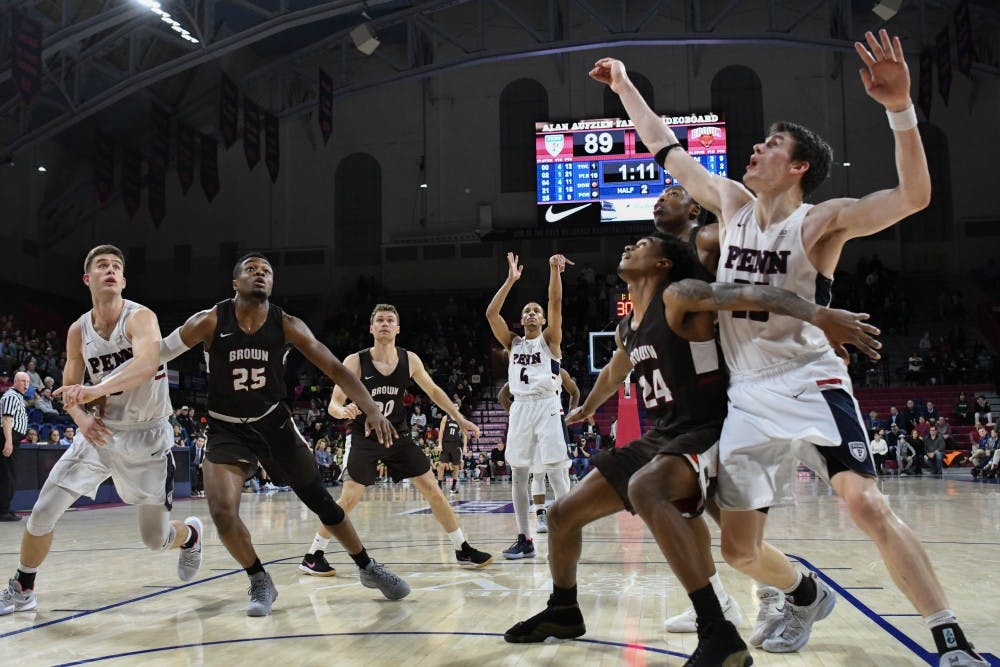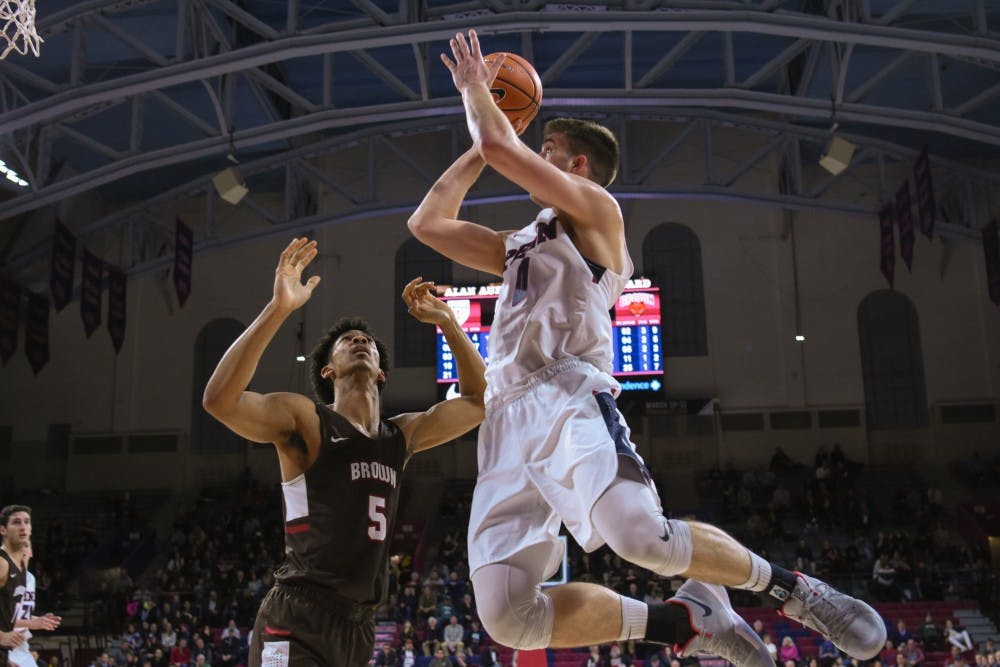
The Quakers attempted 44 free-throws, including 11 by senior guard Darnell Foreman. For the most part, they made the most of their trips to the charity stripe, sinking 30.
Credit: Sam HollandPenn men’s basketball gave the Palestra crowd (and the members of the Class of '22 in attendance) a game to remember in its 95-90 victory over Brown on Friday night. Although the Quakers did not play their best basketball, they had enough in the tank to improve to 4-0 in Ivy League play ahead of Saturday’s huge matchup versus Yale. Here are five takeaways from the thriller at the Palestra:
The Quakers have the clutch factor late in games
While Penn’s first three Ivy League victories were all closely contested games, the Quakers’ will had not been tested to the extent that it was on Friday night at the Palestra. Penn found itself down by six points with about three minutes remaining. Needing a few stops and scores, the Red and Blue dug deep by locking down the Bears defensively and hitting clutch free throws on the other end.
Heavily involved in the effort to get back into the game was senior guard Darnell Foreman, who made four free throws down the stretch to ultimately tie the game. This is not the first time that Foreman has been unfazed by the pressure at the line, and at this point, we should expect nothing less from the experienced captain.
On the defensive end, sophomore forward AJ Brodeur came up with a big rebound and later a clutch block on Brown forward Tamenang Choh to keep the game knotted up at 82. In the overtime period, defense was once again the calling card for the Quakers, as they held the Bears to just two points in the final minute and a half.
The gutsy finish proved that when the game gets close, Penn trusts in its defense and does not get flustered easily. The question now is whether or not the Quakers can continually pull out these types of late-game performances for the rest of the season.
Brown’s Cambridge will be a problem for other teams
The fact that Brown guard Desmond Cambridge is a freshman should scare everyone in the Ivy League. Whether or not he’s being guarded, the 6-foot-4 guard from Nashville always has a good chance of putting the ball in the bucket.
With a turnaround jumper that is nearly impossible to block, Cambridge, number 24, showed some flashes of looking a little like an Ivy League version of another number 24, Kobe Bryant. That’s not to say that he’s going to be the next Kobe, but the way Cambridge was making difficult shots was awfully impressive.
Case in point: Penn coach Steve Donahue was relatively pleased with his team’s defensive effort, despite the fact that Cambridge dropped 29 points.
“I think Antonio [Woods] is one of the better defenders, if not the best on-ball defender in this league,” Coach Donahue said. “I thought Cambridge surprised him at first and then got it going and then made harder [shots]. I really didn’t think we let our guard down too much on that kid.”
Perhaps the most impressive part of this scoring performance was the efficiency with which Cambridge shot the ball. Finishing 12-for-19 from the field, Cambridge did not need a whole lot of shots to get his points. The rest of the Ivy League should be on notice because they’re going to have to deal with this guy for the next four years.
Wood and Woods shined offensively
In a game that had no shortage of scoring, two players for Penn stood out: junior guard Antonio Woods and senior guard Caleb Wood. Woods dropped 21 points, while Wood bested him by just one, scoring 22. Sometimes the three ball is just falling, and that was certainly the case for these two on Friday night, with each making four shots from distance.
One of these three point buckets was especially important for the Quakers. As the first half clock was winding down, Woods pulled up from about 30 feet from the basket and drilled a long range bomb at the buzzer, putting Penn just one point behind Brown at the half.
Wood, for his part, came off the bench hot, making the most of his 28 minutes. Along with his excellent three-point shooting, the senior made a couple contested mid-range jumpers, giving the Quakers life whenever they needed it.
These performances were particularly important in a game in which sophomore guard Ryan Betley (4-for-10) and Brodeur (3-for-9) did not have their best performances in terms of shooting. Penn prides itself on being a team that can get contributions from any player on any given night, and the team will surely need more performances like this from Woods and Wood to win Ivy games in the future.

The Quakers allowed too many easy buckets
There’s no doubt that Penn stepped up in a big way on defense late in the game. Without the late-game defensive team effort in the final couple of minutes, the Quakers would not have won the game. With that being said, Brown was able to get too many uncontested layups down low, either from defensive breakdowns or off offensive rebounds.
In total, the Bears notched 11 offensive boards, leading to 12 second chance points. Brown also totaled 16 assists, tied for the most that the Penn has given up in a game all season. This is partly due to the high-powered Brown offense that leads the Ivy League in points per game with 77.1. The Quakers, though, have to do a better job of not letting the opposing offense get too comfortable.
Penn’s offense kept Brown on its heels
The Red and Blue were quite aggressive driving to the basket, a big reason why they were able to attempt 44 free throws on the night. Oddly enough, that is not the most the Quakers have shot in a game this season; they attempted a grand total of 51 in their quadruple overtime win against Monmouth earlier in the year.
Regardless, Penn put Brown in a lot of tough positions on Friday. The Bears’ game plan to combat the size of Brodeur and Rothschild was to be physical with them. While Brown’s defense did force some turnovers down low, the group was not able to defend without fouling throughout the game. As a result, 64 of Penn’s 95 points came either from inside the paint or at the foul line.
While the Quakers will not take this many foul shots in every game, this type of aggressive offensive mindset will continue to pay dividends for them.
The Daily Pennsylvanian is an independent, student-run newspaper. Please consider making a donation to support the coverage that shapes the University. Your generosity ensures a future of strong journalism at Penn.
Donate



